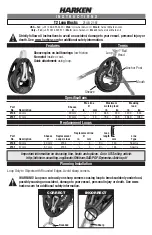
Installation Note N5222-90114 77
Installation Procedure for the Upgrade
Step 53. Perform Post-Upgrade Adjustments and Calibration
Adjustments
The following adjustments must be made due to the hardware changes of the
analyzer.
— EE default Adjustment
— source adjustment: Synth LO only (Version 6 synthesizers)
— synthesizer bandwidth Adjustment (only run if the EE default adjustment is
insufficient)
— Source Adjustment
— IF Gain Adjustment
— Receiver Characterization
— Receiver Adjustment
— IF Response Adjustment (S93090xA/B, S93093A/B, or S93094A/B Only)
These adjustments are described in the PNA Service Guide and in the PNA
on-line HELP. A list of equipment required to perform these adjustments is also
found in the service guide.
To view this service guide information, click the Chapter 3 bookmark “Tests
and Adjustments” in the PDF Service Guide
1
.
After the specified adjustments have been performed, the analyzer should
operate and phase lock over its entire frequency range.
EEPROM Backup
The analyzer uses arrays of correction constants to enable the analyzer to
produce accurate, leveled source signals and receive clean test signals. These
constants are stored in non-volatile EEPROM memory and in flash memory
files.
The adjustments listed here generate new correction constants. The analyzer
must have a backup of this new data in case any of the data becomes
corrupted.
IMPORTANT!
The 10 MHz reference crystal oscillator is the most accurate after running
for three hours. The 10 MHz Frequency Reference Adjustment can be run
after the PNA has warmed up for 90 minutes, and the other adjustments
can be completed in the order presented, but then the 10 MHz Frequency
Reference Adjustment should be repeated after the PNA has been able to
warm up for three hours.
1. See












































